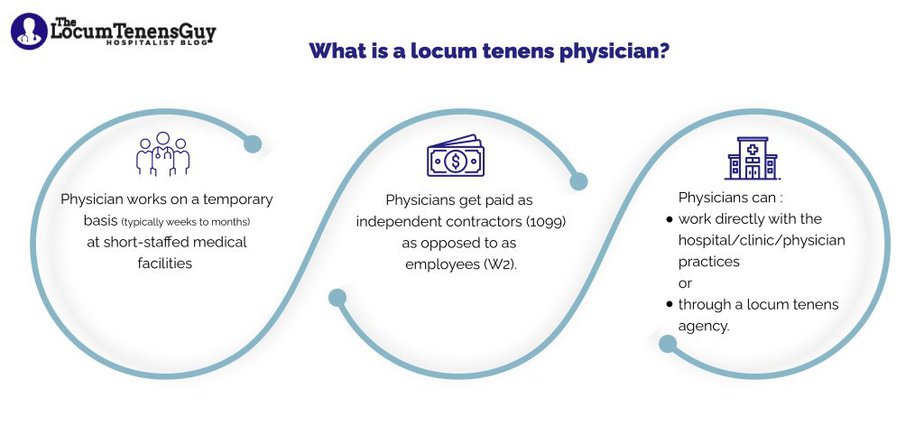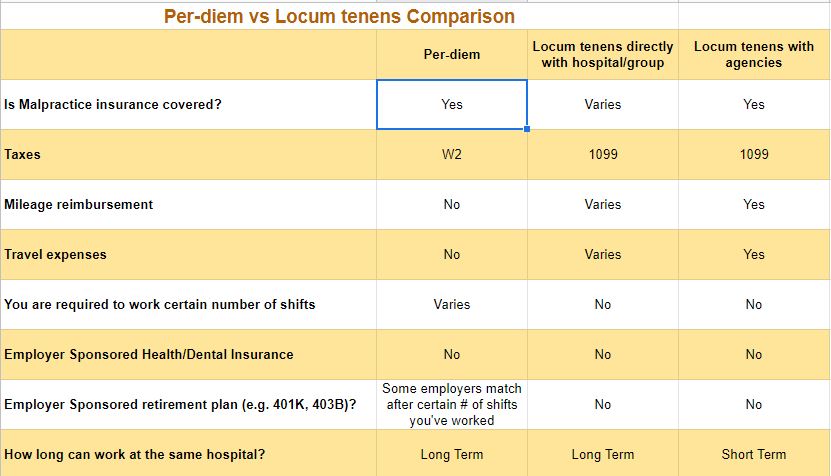

Vlad Dzhashi, MD
Many physicians wonder about the pros and cons of locum tenens. It can be difficult to find a balanced and objective source that provides this content. Since the pandemic, burnout is increasing and providers are seeking alternatives to full-time work, but many don’t know where to start.
Look no further…
You will find information on locum tenens jobs, including working with recruiters and staffing agencies and how to negotiate placements. Whether you seek part-time or a full-time job, this short guidebook will give you an advantage when pursuing locum tenens positions. Following this review, you will understand the major differences between working in a healthcare facility as an independent contractor versus as an employed physician. Enjoy this comprehensive review of locum tenens and the work-life balance it can provide.
Locum tenens pros
Money
Independent contractor status
Flexibility
Schedule
No matter if you are in pediatrics, trained as a hospitalist or psychiatrist, you have control over your schedule. Whether you wish to replace full-time hours, work less, or schedule long breaks, your schedule is negotiable. You can choose placements that are short or long-term, that provide extra income or provide a full-time job. You can even elect to start a new job at regular intervals. Not only can you select the duration of a job, you can also negotiate the length of your working day, call schedules and weekend obligations. You are free to negotiate any scheduling terms.
Adventures/travel
Geoarbitrage
Locum tenens cons
The cons of locum tenens can be unsettling for some providers. However, with careful planning and understanding, many of the issues can be easily managed or even converted to a benefit. The following discussion will highlight the cons of locum tenens and provide tools to minimize their impact.
Being away from home
Learning new systems
Another big hurdle for some is the need to learn a new system with every move to a different facility. This learning period is always stressful and less efficient. This is particularly true if you are learning a new EMR. Credentialing and privileging may also become tedious.
If you do not deal well with the stresses of a new environment, locum tenens is probably not a good fit for you. However, if you are, say, fresh out of residency and opt to give locums a try, there are useful benefits.
If you change environments and systems often, you will develop handy skills. You will learn to quickly become accustomed to new systems, and you will become a pro at learning new electronic medical records systems. You will become adept at collecting useful information. You will make a habit of getting contact information for key personnel, including both people on the administrative and clinical sides of the facility. You will become a pro at orientations! These skills will help you for not only the rest of your career but for the rest of your life.
“Toxic” environment
There is always a risk of landing in a toxic environment and being miserable. To avoid these situations, it is important to vet the facility thoroughly and gather as much information as you can in advance. Not only will this allow you to make an informed decision, but it provides you with leverage should the information later prove to be false.
You may want to test the waters initially with only a few shifts, allowing you to cancel in advance of 30 days should the experience be poor. With a locum tenens job, if conditions are so bad they pose a threat to patient safety or a risk to your license, you can simply leave. Unlike a permanent position, it is much easier to quit if the locum tenens position is bad.
Continuity of Care
A significant challenge of working short-term as an outside contractor is the potential impact on patient care, including the lack of continuity of care. Coordinating follow-up for patients after you leave can be challenging. Some fields, such as psychiatry or pediatrics, do not work as well with locum tenens assignments. Emergency medicine and anesthesiology work well within the locum model.
It can be difficult to arrange follow-up for test results and specialist referrals. You may need to develop a network of hospitalists and other physicians with employed positions who can follow up on your behalf. Some locums rotate regularly with other providers which allows for better continuty..
In order to minimize issues with continuity, some locum providers avoid outpatient assignments altogether. I know a pulmonologist who solely takes inpatient locum gigs. Also, there are locum tenens assignments that are of longer duration, allowing for greater continuity.
Continuity of Care
Not enough work
One of the top concerns is not being able to get enough work. It is helpful to maximize your opportunities by signing with as many healthcare staffing agencies as possible. Keep a record of all recruiters and the associated placements. Try to apply for local assignments because a local candidate may be preferred over someone who will require travel expenses.
“Sleazy” recruiters
While there are some wonderful staffing agencies, there are other entities who use questionable practices. Tactics range from broken promises to outright lying. Staffing agencies may attempt to undercut you by offering you nurse practitioner or physician assistant salaries or positions. A recruiter might try to convince you to sign an exclusive commitment to their agency at a low rate. Some recruiters will literally say anything to get a contract signed.
“I had two contact lawyers tell me not to sign such a terrible physician service agreement.”
“…they one-sidedly canceled my appointment… pending lawsuit.”
“…in the end, they only care about the money they make…seeking a naive physician to do their dirty work…”
A common tactic of some of the less honest agencies is to present you as their hire without your permission. This practice makes it difficult for you to then sign with a different agency for a possibly higher pay rate. You either wind up stuck working for the dishonest group or passing on the opportunity altogether.
Make sure you always communicate to locum tenens agencies that you may not be presented without your explicit permission. Stipulate this verbally and in writing. DO NOT sign a contract unless you are actively negotiating an assignment.








